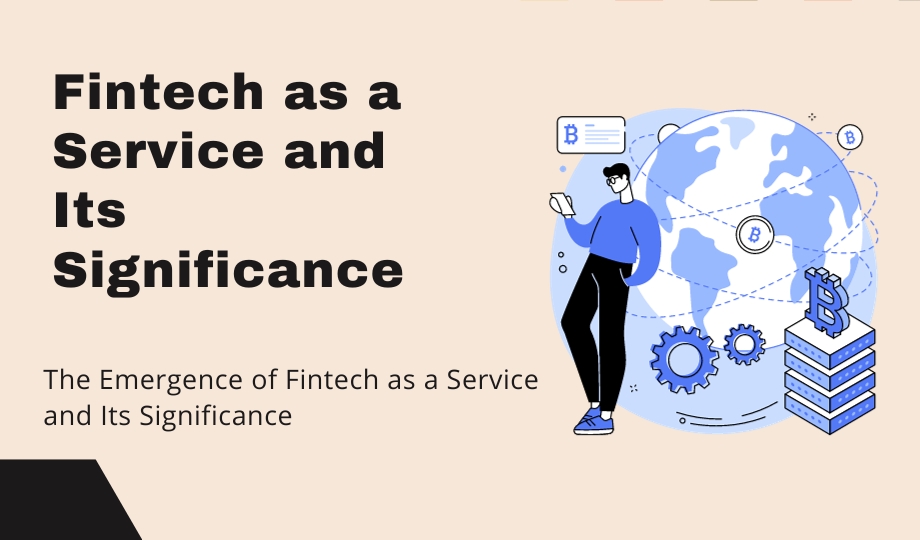Fintech companies are revolutionizing the financial industry with their cutting-edge technology. Their innovation is gradually breaking down the longstanding barriers within traditional finance and banking systems. By challenging existing value chains, business models, and market positions, fintech firms are reshaping the financial landscape, making it more customer-centric and interactive.
The Rise of Fintech-as-a-Service (FaaS)
In recent years, Fintech-as-a-Service startups have gained momentum, and industry analysis by IndustryARC suggests that the global FaaS market will reach $161 billion by 2026. This remarkable growth can be attributed to the transformation of payment management, credit, insurance, and financial processes brought about by digital technologies.
Traditional banks face stiff competition from Fintech infrastructure, which offers extensive optimization opportunities. Financial institutions relying on outdated systems are losing market share to these newcomers.
This blog delves into the success story of the Fintech-as-a-Service business model and explores its implications for the financial sector.
Understanding Fintech as a Service (FaaS)
Fintech-as-a-Service, or “FaaS,” involves offering financial technology as a service to other financial market participants. This can include providing APIs that can be seamlessly integrated into their systems. A typical Fintech platform enables businesses from various niches to access multiple payment solutions through a single integration.
Traditional lending organizations are increasingly adopting fintech technologies to leverage innovative business functions and financial processes. The rising popularity of digital payments, digital lending, insurance, wealth management, and robo-advisory services has fueled the demand for technology-backed banking solutions.
By utilizing a Fintech-as-a-Service platform, financial institutions can optimize their end-to-end processes, ensuring the efficient delivery of on-demand commercial services over the internet within defined timelines. FaaS solutions encompass comprehensive delivery environment management and deployment, along with adherence to legal compliance and robust security measures.
Latest Trends in Fintech as a Service
The global pandemic has significantly altered our way of life, work, and commerce. This has had a profound impact on both traditional banks and fintech companies, which must innovate to maintain a competitive edge. As we progress into 2022 and beyond, several key trends are driving change in the Fintech-as-a-Service domain:
Invisible Banks: Traditional visits to physical banks, queuing, and dealing with bureaucracy are fading into the past. Artificial intelligence, voice assistant-integrated APIs, and cloud computing create intelligent, cost-effective interactions between clients and institutions, facilitating seamless online transactions.
Open Banking: Open banking is currently one of the most significant trends in the fintech sector. It involves customers granting secure access to their banking and financial data to banks and third-party financial service providers. This enables businesses to offer tailored products and services while enhancing data security.
Instant Payments: The use of QR Code technology for instant payments is a highly promising development. With any mobile device equipped with a camera, banking is made more accessible. Instant payments are poised to transform the future of the financial sector.
Artificial Intelligence (AI) and Machine Learning (ML): Machine learning applications process vast volumes of data to yield valuable insights, improving efficiency and decision-making in areas such as fraud detection, lending approvals, AML screening, risk management, and investment forecasting.
Banking as a Service (BaaS): BaaS platforms have emerged as a cost-effective way for banks to offer financial services based on open banking principles. Traditional banks are integrating BaaS services into their digital transformation strategies, enhancing their offerings.
Cross-border Payments: Real-time payment solutions are rapidly gaining adoption, reducing payment risks, enhancing cash flow efficiency, and giving businesses a competitive advantage. Expect cross-border payments to grow in significance.
Benefits of a Fintech as a Service Platform
The fintech sector continually adapts to meet the evolving needs of investors, customers, and regulators. Fintech recognizes the impact of modern technologies on generating revenue, improving process efficiency, enhancing user experiences, and mitigating business risks. Some key benefits of Fintech-as-a-Service platforms include:
Fraud and Chargebacks Reduction: FaaS platforms, compliant with stringent security standards like PCI DSS, offer robust fraud prevention, saving businesses and customers from financial losses.
Faster Time to Market: Integration with a FaaS platform expedites the launch of payment flows and products, enabling businesses to reach the market more swiftly.
Unified Tech Stacks: FaaS unifies payment, financial management, and money movement services into a single, scalable API, prioritizing customer experience and enabling global expansion.
Reduced Processing Costs: Merchants can choose from multiple service providers for each transaction, reducing costs for both businesses and customers.
Localized Payment Methods: Local payment networks accepting various payment methods are crucial for expanding businesses, and FaaS platforms facilitate access to these networks.
Enhanced Security: Fintech companies are equipped to navigate regional regulations effectively, providing robust security and compliance.
In Conclusion
Fintech-as-a-Service (FaaS) is a prominent trend in the global financial market, offering speed and flexibility that traditional in-house payment platforms struggle to match. Fintech is here to stay, shaping the future of payments with intense competition and high demand. These advancements underscore the myriad benefits provided by Fintech-as-a-Service platforms.

